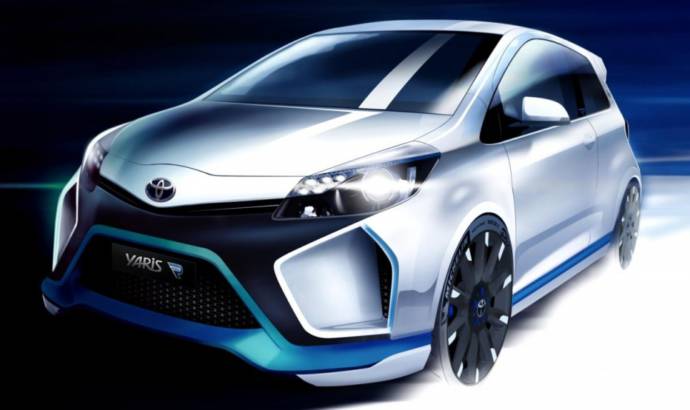Based on the Yaris 3-door, the Yaris Hybrid R concept hybrid powertrain configuration combines the powerful 1.6l petrol Global Race Engine with two powerful electric motors to provide an ‘intelligent’ electric four-wheel drive capability.
The front wheels are driven by a 300hp 4-cylinder 1.6 turbo engine with direct injection specifically developed by Toyota Motorsport GmbH (TMG) according to the rules of the International Automobile Federation (FIA) for a Global Race Engine to be utilised in various motorsport disciplines.
At the rear, each wheel is individually powered by a 60hp electric motor – the same as those used in the standard Yaris Hybrid. Taken together, the hybrid powertrain system develops a total system output of up to 420 hp.
The two electric motors work as electric generators during the braking phase, and supplement the petrol engine during the accelerating phases.
Just like in the TS030 HYBRID, the energy recovered during the braking phase is stored in a super capacitor. Compared to the standard NiMh hybrid battery, the super capacitor has a higher power density and a fast power charge / discharge speed. It is perfectly suited to the requirements of sporty driving on track, which requires brief and immediate bursts of power.
Nevertheless, level of power depends on the duration of energy delivery desired. In road mode, the super-capacitor releases the energy recovered under braking for a maximum duration of 10 seconds per charge and the total power of the two electric motors is reduced to 40 hp. In track mode, the rear electric motors reach a combined maximum power of 120hp for up to 5 seconds per charge, reflecting the higher frequency of braking and acceleration events during circuit driving.
A 3rd 60hp electric motor, located between the engine and the 6 gear sequential transmission, operates as a generator in two different cases: during deceleration to feed the super capacitor and during acceleration to directly power the rear electric motors.
The latter will only happen when the engine power and torque exceed the grip potential of the front wheels. The generator behaves like an advanced traction control system, redirecting the torque as electric energy to the rear wheels, to boost the acceleration and improve the handling rather than to simply limit the engine power.
Rear electric motors – one per wheel – can greatly influence the Yaris Hybrid-R handling characteristics during cornering by altering the distribution of torque between the left and right rear wheels.
Each motor can be used independently as a generator or a motor to achieve the same effect as an intelligent torque vectoring differential.



